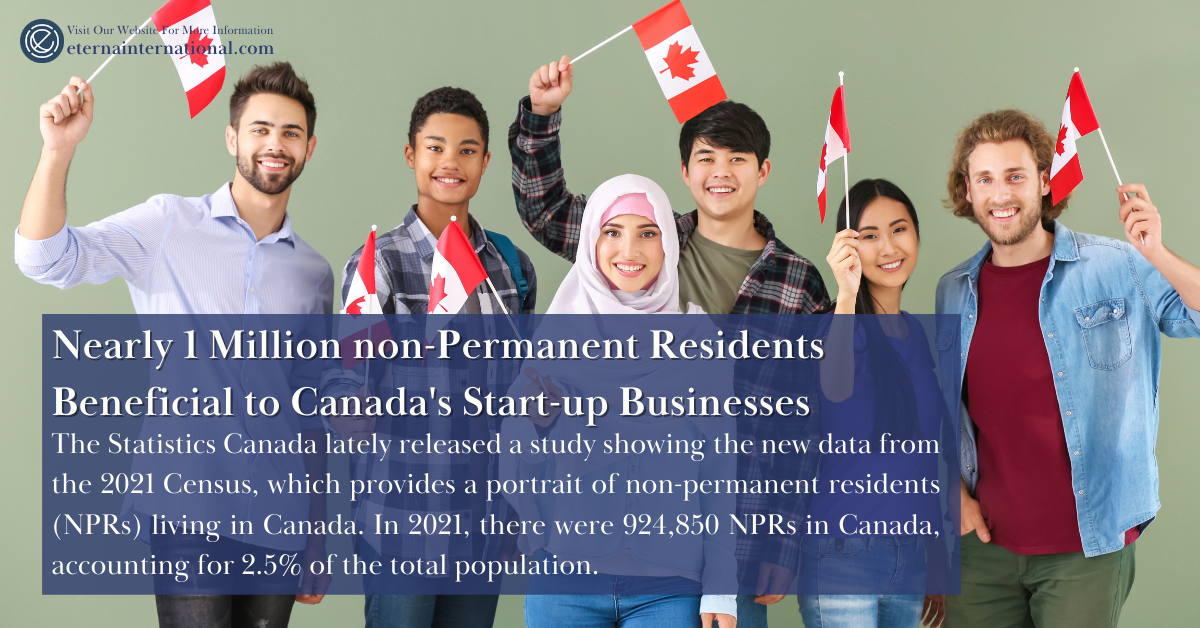The Statistics Canada lately released a study showing the new data from the 2021 Census, which provides a portrait of non-permanent residents (NPRs) living in Canada. In 2021, there were 924,850 NPRs in Canada, accounting for 2.5% of the total population.
Canada’s nearly 1 million NPRs offer a wealth of opportunities for entrepreneurs participating in the Start-up Visa (SUV) program. Here are some ways in which the presence of a large NPR community can be advantageous for start-up founders and contribute to their success:
Language Proficiency
A key factor in the integration and success of non-permanent residents (NPRs) in Canada is their ability to communicate in one or both official languages, English and French. In 2021, a vast majority (95.3%) of NPRs enumerated in the Census had knowledge of an official language. This language proficiency can have a significant impact on the Start-up Visa (SUV) program and the entrepreneurs participating in it.
The high proportion of NPRs with knowledge of an official language can facilitate effective communication and collaboration between entrepreneurs in the SUV program and other stakeholders in the Canadian ecosystem, such as investors, mentors, and service providers. This can help start-up founders establish strong working relationships, convey their business ideas more effectively, and secure the resources and support needed to grow their businesses.
Language proficiency in English and/or French can help NPRs, including those in the SUV program, navigate the Canadian business environment more easily and access a wider range of resources and opportunities. This includes government programs, funding sources, business networks, and educational resources that can be crucial for the success of start-ups in the early stages of development.
A Young and Dynamic Population
The non-permanent resident (NPR) population in Canada is characterized by a significant share of younger individuals, particularly young adults between the ages of 20 to 34 years. According to the 2021 Census, just over three in five NPRs (60.1%) fell within this age group, compared to 37.3% of recent immigrants and 18.4% of the rest of the Canadian population. The gender distribution among NPRs leans slightly towards men, with 54.0% being male. This is in contrast to the rest of the Canadian population, which has a slight majority of women (50.7%).
The high proportion of young adults among NPRs provides start-ups in the SUV program with access to a young and dynamic workforce. Younger individuals tend to be more adaptable, open to new ideas, and eager to learn, making them valuable assets for start-ups that often require employees to take on multiple roles and adapt quickly to changing market conditions. This can contribute to greater innovation and resilience in the face of challenges.
With nearly four in five NPRs with a work permit only (79.9%) belonging to the core working age group (25 to 54 years), start-ups in the SUV program can benefit from a labor pool that is in its prime working years. This demographic is likely to have a blend of education, experience, and skills that can contribute to the development and growth of start-ups. Furthermore, the core working age group typically demonstrates greater stability in terms of employment, which can be advantageous for start-ups seeking long-term team members.

Highly Educated
The high level of educational attainment among non-permanent residents (NPRs) in Canada. Close to half of all NPRs aged 15 years and older had a bachelor’s degree or higher (47.8%), a proportion much higher than the rest of the population (26.1%).
NPRs with a bachelor’s degree or higher provide start-ups in the SUV program with access to a highly skilled and educated workforce. This can help start-ups recruit employees with specialized knowledge and expertise in various fields, contributing to their growth and success. In addition, a skilled workforce can improve the overall competitiveness and innovation of start-ups in the global market.
A majority of NPRs (63.3%) obtained their postsecondary certification outside Canada, with the exception of those with work and study permits. This international education and experience can bring diverse perspectives and ideas to start-ups in the SUV program, helping them develop innovative products and services and expand into global markets.

High Labour Force Participation Rate
The labor force participation rate among non-permanent residents (NPRs) in Canada is notably higher than that of the rest of the Canadian population, as observed in the 2021 Census. For the population aged 15 years and older, 74.2% of NPRs participated in the labor force during the Census reference week, compared to 63.4% for the rest of the population.
The high labor force participation rate among NPRs suggests that they represent an active and engaged workforce that is eager to contribute to the Canadian economy. This can be beneficial to start-ups in the SUV program, as it indicates a greater pool of potential employees who are motivated and interested in working.
The unemployment rates among NPRs vary widely depending on the type of work permit they hold. NPRs with a work permit only had the highest participation rate (88.0%) and the lowest unemployment rate (7.2%), while those with study permits only had the lowest participation rate (51.5%) and the highest unemployment rate (17.8%). This information can be useful for start-ups in the SUV program when identifying and targeting potential employees from different NPR groups.
In conclusion, the nearly 1 million non-permanent residents in Canada can offer numerous benefits to the Start-up Visa program applicants, including access to a skilled workforce, networking opportunities, cultural diversity, and market opportunities. By leveraging these advantages, entrepreneurs in the SUV program can strengthen their start-ups’ prospects for success and contribute to Canada’s overall economic growth and innovation.





